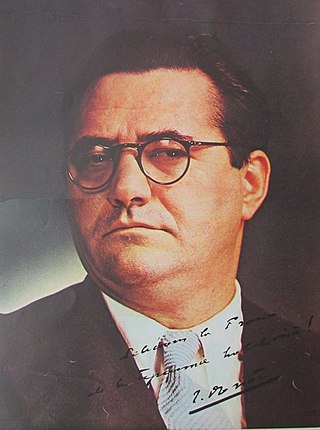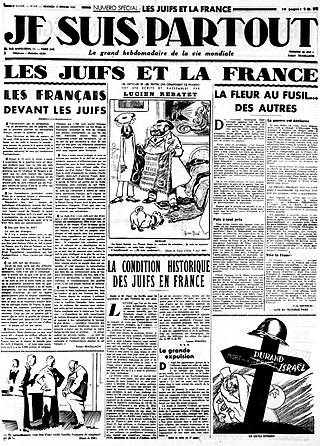
Pierre Eugène Drieu La Rochelle was a French writer of novels, short stories, and political essays. He was born, lived and died in Paris. Drieu La Rochelle became a proponent of French fascism in the 1930s, and was a well-known collaborationist during the German occupation. He is best known for his books Le Feu Follet and Gilles.

Jacques Doriot was a French politician, initially communist, later fascist, before and during World War II.

Marcel Déat was a French politician. Initially a socialist and a member of the French Section of the Workers' International (SFIO), he led a breakaway group of right-wing Neosocialists out of the SFIO in 1933. During the occupation of France by Nazi Germany, he founded the collaborationist National Popular Rally (RNP). In 1944, he became Minister of Labour and National Solidarity in Pierre Laval's government in Vichy, before escaping to the Sigmaringen enclave along with Vichy officials after the Allied landings in Normandy. Condemned in absentia for collaborationism, he died while still in hiding in Italy.

The French Popular Party was a French fascist and anti-semitic political party led by Jacques Doriot before and during World War II. It is generally regarded as the most collaborationist party of France.

Je suis partout was a French newspaper founded by Joseph-Arthème Fayard, first published on 29 November 1930. It was placed under the direction of Pierre Gaxotte until 1939. Journalists of the paper included Lucien Rebatet, Alain Laubreaux, the illustrator Ralph Soupault, and the Belgian correspondent Pierre Daye.
Wartime collaboration is cooperation with the enemy against one's country of citizenship in wartime. As historian Gerhard Hirschfeld says, it "is as old as war and the occupation of foreign territory".

The Francist Movement was a French fascist and anti-semitic league created by Marcel Bucard in September 1933 that edited the newspaper Le Francisme. Mouvement franciste reached a membership of 10,000 and was financed by the Italian dictator, Benito Mussolini. Its members were deemed the francistes or Chemises bleues (Blueshirts) and gave the Roman salute.

The Vel' d'Hiv' Roundup was a mass arrest of Jewish families by French police and gendarmes at the behest of the German authorities, that took place in Paris on 16–17 July 1942. The roundup was one of several aimed at eradicating the Jewish population in France, both in the occupied zone and in the free zone that took place in 1942, as part of Opération Vent printanier. Planned by René Bousquet, Louis Darquier de Pellepoix, Theodor Dannecker and Helmut Knochen; It was the largest French deportation of Jews during the Holocaust.

The Military Administration in France was an interim occupation authority established by Nazi Germany during World War II to administer the occupied zone in areas of northern and western France. This so-called zone occupée was established in June 1940, and renamed zone nord in November 1942, when the previously unoccupied zone in the south known as zone libre was also occupied and renamed zone sud.
Jean-Pierre Azéma is a French historian.

The Révolution nationale was the official ideological program promoted by the Vichy regime which had been established in July 1940 and led by Marshal Philippe Pétain. Pétain's regime was characterized by anti-parliamentarism, personality cultism, xenophobia, state-sponsored anti-Semitism, promotion of traditional values, rejection of the constitutional separation of powers, modernity, and corporatism, as well as opposition to the theory of class conflict. Despite its name, the ideological policies were reactionary rather than revolutionary as the program opposed almost every change introduced to French society by the French Revolution.

The National Popular Rally was a French political party and one of the main collaborationist parties under the Vichy regime of World War II.
The Frontist Party, also known as the Common Front or Social Front, was a political party in France founded in 1936 by Gaston Bergery and Georges Izard. It was a founding member of the Popular Front.
Robert Soucy is an American historian, specializing in French fascist movements between 1924 and 1939, French fascist intellectuals Maurice Barrès and Pierre Drieu La Rochelle, European fascism, twentieth-century European intellectual history, and Marcel Proust's aesthetics of reading.
Led by Philippe Pétain, the Vichy regime that replaced the French Third Republic in 1940 chose the path of collaboration with the Nazi occupiers. This policy included the Bousquet-Oberg accords of July 1942 that formalized the collaboration of the French police with the German police. This collaboration was manifested in particular by anti-Semitic measures taken by the Vichy government, and by its active participation in the genocide.

Le Juif et la France was an anti-Semitic propaganda exhibition that took place in Paris from 5 September 1941 to 15 January 1942 during the German occupation of France in the Second World War. A film version of the exhibition came out in French cinemas in October 1941.
Léon Émery was a French pacifist activist and a French collaborationist with the Nazi regime.

The Government of Vichy France was the collaborationist ruling regime or government in Nazi-occupied France during the Second World War. Of contested legitimacy, it was headquartered in the town of Vichy in occupied France, but it initially took shape in Paris under Marshal Philippe Pétain as the successor to the French Third Republic in June 1940. The government remained in Vichy for four years, and fled into exile to Germany in September 1944 after the Allied invasion of France. It operated as a government-in-exile until April 1945, when the Sigmaringen enclave was taken by Free French forces. Pétain was brought back to France, by then under control of the Provisional French Republic, and put on trial for treason.
François Bédarida, was a French academic historian. His work centred on Victorian England and France in WWII. He made significant research contributions to the study of The Holocaust. He was a director of the Maison française in Oxford among other leadership roles.

Devant l'Allemagne éternelle is a book by the French journalist and politician Charles Maurras, director of L'Action française published in 1937. The work was composed during the author's period of detention in La Santé prison from October 20, 1936, to July 6, 1937, for death threats against Léon Blum. He compiles "texts written for forty years on Germany, pan-Germanism and German influence in France".













